The Most Expensive Coffee In The World: Kopi Luwak (A.k.a. Civet Coffee)
Last updated on
If you are a coffee drinker, you must know that freshly-brewed organic coffee has many health benefits. Research has shown that coffee not only provides a caffeine boost, it could also prevent heart attack and keep diseases at bay. Meet kopi luwak, the most expensive coffee in the world for good reasons.
Kopi luwak originates from Indonesia (it is also known as cat-poop coffee or civet coffee). Luwak means civet, which is a small nocturnal mammal from the cat family that lives in the tropical rain forests.
What do I mean “cat-poop”? How can “cat poop and coffee” be put together in one sentence? Simply because the coffee beans used for making this world’s most expensive coffee has gone through the civet cat’s digestive system and was excreted.
Ok, some of you may think “eeewwwww …”, and some of you may be curious.
Other Foods That Are PreProcessed By Animals
Before you write off kopi luwak, think about this. Civet coffee is not the only food that humans consume that is first eaten by an animal. Consider these:
Argan Oil: Ever heard of Moroccan Argan Oil? In Morroco, there is a specie of goats that climb the argan tree to eat of the small fruits. The pits from the fruit are either spat out, or excreted undigested in their feces. Farmers pick these pits, split them up to extract the kernels inside, grind and press them to make a nutty oil used in cooking and cosmetics.
- Honey: Honey bees collect nectar from flowers, store it in their “honey stomachs” which is different from their food stomach. When they have a full load, they fly back to the hive, secrete enzymes into it and convert the nectar into honey. Then the bees regurgitate the honey that we eat raw. Raw honey is the best, remember?
Jacu Bird Coffee: In Brazil, a type of bird called Jacu, eats ripe coffee berries, later defecates them in the jungle where local people collect them and process the defecated coffee berries into premium Jacu Bird Coffee.
- Bird’s Nest: In Asia, small swift birds make their nests from their own saliva which solidifies. These birds’ nests are collected and processed into expensive medicinal food that is eaten for beauty and longevity.
Elephant Dung Coffee: In Thailand, Arabica coffee beans consumed by elephants go through their digestive enzymes, breaking down the coffee’s protein and are excreted. The coffee beans are digested and together with various other enzymes present in the elephant’s stomach, imparts specific flavor to the excreted beans that are processed into very expensive coffee.
Why Kopi Luwak?
The civet cats play three main roles in producing this most expensive coffee. And the best coffee comes from the wild civet cats, not the caged/bred civet cats.
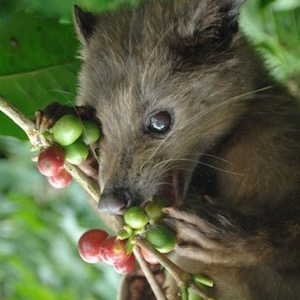
Wild civet cats know to choose and eat only the best coffee berries. But, the experts say that their droppings are also the most difficult to harvest, thus the high cost at up to US$1,500 per kilogram.
The civets then nibble off the thin outer layer of the berries and put their digestive juices to work. The enzymes penetrate the beans and subtly change their chemical balance, altering the taste and flavor of the coffee.
While in the digestive tract of the civet, two important things happen …
- Fermentation: produces antibacterial properties that are beneficial for human’s digestive tract.
- Germination: like sprouting, have the highest amount of nutrients and antioxidants during this stage.
Is Kopi Luwak Safe For Human Consumption?
Dr Massimo Marcone, a food scientist from the University of Guelph in Canada “was skeptical that anything being in contact with feces is safe.” After examining the chemical and physical properties of kopi luwak or civet cat poop coffee, Dr Massimo reported that …
- it has lower bacterial counts than regular coffee.
- it has negligible amounts of pathogenic (cancer-causing) organisms associated with feces.
- the cat’s stomach acids and enzymes digest the beans and ferment them, giving the coffee a unique flavor.
- the kopi luwak beans were found to be smoother, possibly due to the surface exfoliation by gastric acids and/or enzymes of the civet cat.
- as the beans take at least 24 to 36 hours being processed in the digestive tract of the civet, the beans start to have partial germination process which makes the beans to have the most nutrients at this stage.
- the kopi luwak beans were partially broken down and have reduced protein that probably affect the flavor and aroma of the bean, making it less bitter.
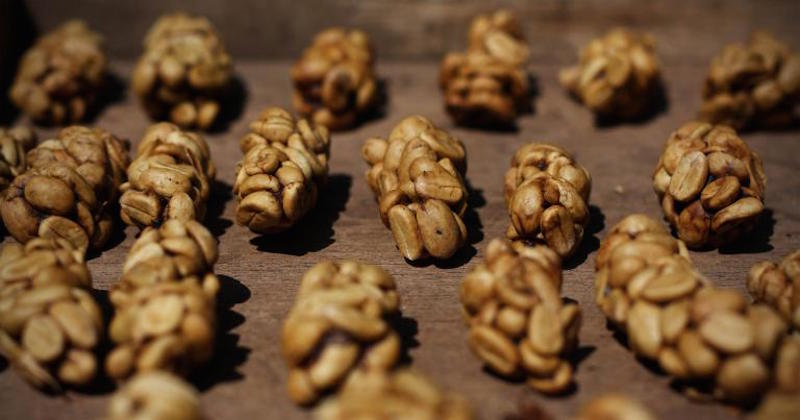
The Health Benefits Of Kopi Luwak (Civet Coffee)
Kopi luwak has been around for many decades and has been evaluated by many laboratories around the world. From the nutrients and antioxidants observed in this special coffee, it can be deduced that drinking it daily without sugar and creamer provides immense health benefits.
Cancer: According to the Journal of Nutrition, women who consume at least four cups of civet coffee daily reported a decreased risk of breast cancer by 38%.
Gallstones: Drinking 2-3 cups of civet coffee daily provides xanthine, a compound that can reduce the risk of gallstone-formation in the gallbladder.
Heart Disease: Drinking civet coffee helps to dilate blood vessels, allowing for better blood circulation, preventing heart diseases and strokes.
Peptic Ulcer: Due to the very low acidic concentration in this expensive coffee, it is suitable and even beneficial for individuals suffering from peptic ulcers and digestive issues.
Diabetes: Unlike regular coffee that suppresses the body’s insulin resistance, civet coffee is actually beneficial for type 2 diabetics.
Dementia: Drinking civet coffee can increase mental clarity and provides a boost of energy. It is reported to prevent cell damages associated with dementia, brain inflammation, Parkinson’s and Alzheimer’s diseases.
Anti-inflammatory: Civet coffee provides anti-inflammatory properties that reduce various bodily aches and pains.
Bacterial infections: The anti-bacterial properties in civet coffee prevents gum disease, urinary tract infections and other infections caused by disease-causing microbes such as Candida, ringworm, shingles, athlete’s foot and more.
Skin health: As civet coffee helps the digestive tract health, skin conditions such as psoriasis, eczema and dermatitis may also benefit from it.
We Are Against Animal Cruelty
Real kopi luwak is a natural animal process that the local people collect, process and roast. Unfortunately, due to the high demand for this expensive coffee, unscrupulous farmers have resorted to harvesting the beans unnaturally for profit. They catch, cage and breed civet cats, feeding them with only coffee beans.
While benefiting from the outstanding health benefits of civet coffee, it makes sense to buy this specialty coffee only from the right organizations that protect these animals.
Bantai Civet Coffee is one such organization where the profits are channeled to conserve the civet population by preserving a sanctuary for the civets and educating their local farmers on caring and preserving these cats while benefiting from their natural process.
Kopi luwak is not for everyone but for those who love coffee and are a little more adventurous, here’s where you can buy it, from responsible organizations.
BUY KOPI LUWAK:
Some Of The Comments From Civet Coffee Drinkers
“I never used to like coffee at all, but after trying luwak coffee my world changed. I became addicted.”
“I drink it for its health benefits. I hear that it can prevent asthma, Parkinson’s, colon cancer and diabetes.”
“The aroma is rich and strong, and the coffee is incredibly full-bodied, almost syrupy. It’s thick with a hint of chocolate, and lingers on the tongue with a long, clean aftertaste.”
“This is the best coffee I’ve ever had! Despite stigma about where it comes from, it blows any coffee I’ve ever had out of the water!”
“There’s the sheer amusement of sharing some of this coffee with someone and telling them what civet coffee is. That is priceless!”
References:
https://restaurantengine.com/the-most-expensive-coffee/
https://www.realkopiluwak.com/urban-myth/
https://www.uoguelph.ca/news/archives/002065.html
Some of the links I post on this site are affiliate links. If you go through them to make a purchase, I will earn a small commission (at no additional cost to you). However, note that I’m recommending these products because of their quality and that I have good experience using them, not because of the commission to be made.
Comments
Leave a Reply

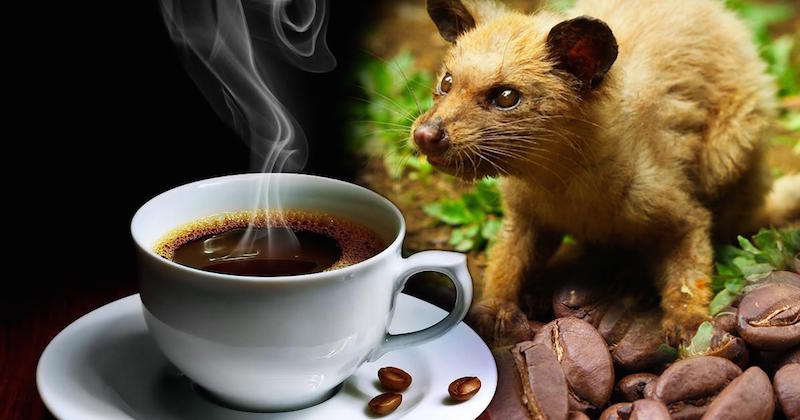
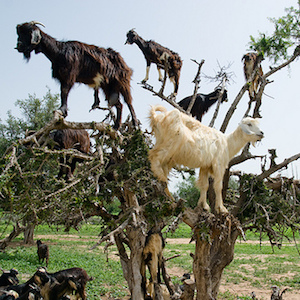 Argan Oil: Ever heard of Moroccan Argan Oil? In Morroco, there is a specie of goats that climb the argan tree to eat of the small fruits. The pits from the fruit are either spat out, or excreted undigested in their feces. Farmers pick these pits, split them up to extract the kernels inside, grind and press them to make a nutty oil used in cooking and cosmetics.
Argan Oil: Ever heard of Moroccan Argan Oil? In Morroco, there is a specie of goats that climb the argan tree to eat of the small fruits. The pits from the fruit are either spat out, or excreted undigested in their feces. Farmers pick these pits, split them up to extract the kernels inside, grind and press them to make a nutty oil used in cooking and cosmetics. Jacu Bird Coffee: In Brazil, a type of bird called Jacu, eats ripe coffee berries, later defecates them in the jungle where local people collect them and process the defecated coffee berries into premium Jacu Bird Coffee.
Jacu Bird Coffee: In Brazil, a type of bird called Jacu, eats ripe coffee berries, later defecates them in the jungle where local people collect them and process the defecated coffee berries into premium Jacu Bird Coffee.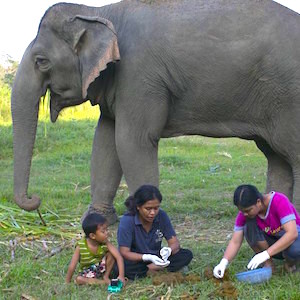 Elephant Dung Coffee: In Thailand, Arabica coffee beans consumed by elephants go through their digestive enzymes, breaking down the coffee’s protein and are excreted. The coffee beans are digested and together with various other enzymes present in the elephant’s stomach, imparts specific flavor to the excreted beans that are processed into very expensive coffee.
Elephant Dung Coffee: In Thailand, Arabica coffee beans consumed by elephants go through their digestive enzymes, breaking down the coffee’s protein and are excreted. The coffee beans are digested and together with various other enzymes present in the elephant’s stomach, imparts specific flavor to the excreted beans that are processed into very expensive coffee.






























 JOIN OVER
JOIN OVER
wah… now i know.